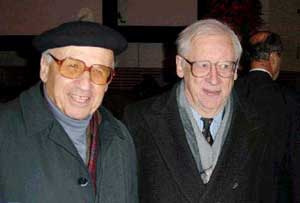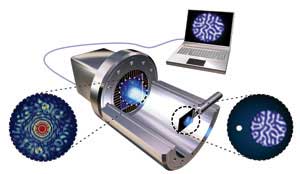John Pople Fathers computational theory in quantum chemistry

John Pople & Walter Kohn
Born in 1925 in Burnham-on-Sea, Somerset (England), Pople received his doctorate in mathematics in 1951 at Cambridge University. A year later, he formulated a basic diagram for developing mathematical models for molecular research without conducting experiments.
After a period of leadership in the Basic Physics Research Center of the UK National Physics Laboratory near London, he quickly felt that it was inappropriate to spend too much time on management, so he moved. settled in the US in 1958
In 1964, Pople became professor of chemical physics at Carnegie Tech, later becoming Carnegie-Mellon University, Pittsburgh (USA). He was knighted by Queen Elizabeth II in 2002 for his contributions to chemical research. In 1986, he moved to work at the chemistry department of Northwestern University (USA).
John Pople, who won the Nobel Prize in 1998 for his great contribution to the development of computing methods for chemistry. He died on March 15, 2004 at his home at the age of 78 for liver cancer.
 Pople was the one who developed computer techniques for checking and identifying chemical structures and details of matter . The computer program he built was used by thousands of universities and businesses around the world. By the 1990s, he edited the program, adding to the density theory of Walter Kohn, the co-recipient of the Nobel Prize in chemistry with him. Kohn is an Austrian scientist working at the University of Santa Barbara (USA). His research, which began in the 1960s, simplifies the mathematical description of the bonds between atoms that make up molecules.
Pople was the one who developed computer techniques for checking and identifying chemical structures and details of matter . The computer program he built was used by thousands of universities and businesses around the world. By the 1990s, he edited the program, adding to the density theory of Walter Kohn, the co-recipient of the Nobel Prize in chemistry with him. Kohn is an Austrian scientist working at the University of Santa Barbara (USA). His research, which began in the 1960s, simplifies the mathematical description of the bonds between atoms that make up molecules.
Pople's computing approach in chemistry has allowed scientists to create computer models of many chemical reactions, which are impossible or very difficult to replicate in the laboratory.His work has a wide range of applications , ranging from the study of stars based on chemical signals measured through telescopes, to understanding how pollutants such as freon react to the floor. ozone. In the field of medicine, researchers also use Pople's computerized quantum chemistry to reproduce the effects of certain drugs against HIV infection.
- Sorry Einstein, new quantum research proposing 'ghost effects' is real
- Quantum theory of awareness: Soul is a form of information
- Sorry Einstein, scientists have found evidence of quantum entanglement
- China set a surprising record of quantum entanglement
- Chemical elements do not follow quantum mechanics theory
- Mistakes of some great people
- This scientist believes that people are living in multiple universes
- How far has the quantum computer developed?
- Newton's second law is tested correctly
- Chinese satellites pass encryption can not be cracked
- Research on lithium-ion batteries won the 2019 Nobel Prize in Chemistry
- What is quantum computing and its importance to people?
 The most famous scientific failures in history
The most famous scientific failures in history Mysterious genius mechanic and the machine froze time
Mysterious genius mechanic and the machine froze time The son carries the 'bad gene' of genius Albert Einstein
The son carries the 'bad gene' of genius Albert Einstein Isaac Newton
Isaac Newton